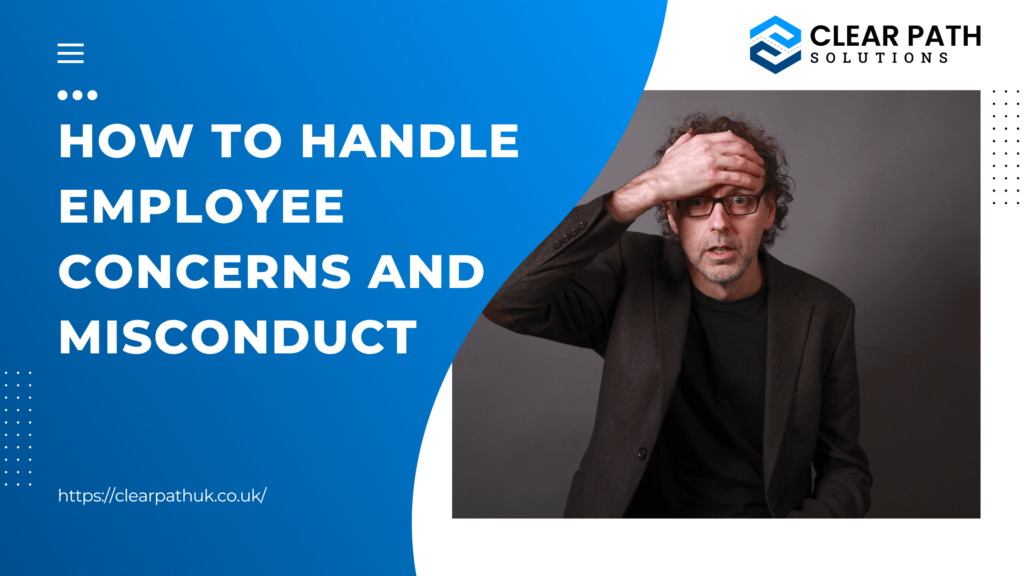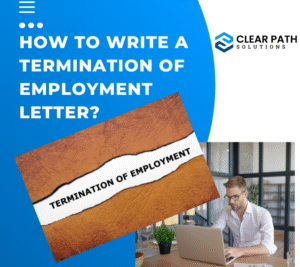How to Handle Employee Concerns and Misconduct: A Practical Guide for UK Employers in 2025

Employee problems can escalate fast — here’s how small and medium-sized UK businesses can address issues fairly, legally, and confidently.
Managing people is one of the most rewarding parts of running a business — but it can also be one of the hardest. Whether it’s a complaint about a colleague, a performance issue, or allegations of misconduct, UK employers need to know how to respond correctly.
And for SMEs without an HR department, navigating employee concerns and misconduct often feels like walking a tightrope — one misstep can lead to legal trouble or workplace tension.
In this guide, we’ll break down what’s legally required, what best practice looks like in 2025, and how ClearPath can help you manage issues quickly, fairly, and with confidence.
Why Handling Employee Misconducts Matters for UK Employers
According to ACAS, workplace conflict costs UK employers £28.5 billion a year, with the average cost of an employment tribunal sitting at £13,000–£30,000.
Even minor issues — when mishandled — can spiral into serious grievances or legal claims.
Poor handling of misconduct or employee complaints can lead to:
- Costly legal action (unfair dismissal, discrimination, or constructive dismissal claims)
- Damaged staff morale and culture
- Reputational harm, especially in smaller industries
- Loss of productivity and trust among your team
The good news? When handled properly, even tough situations can lead to better communication, trust, and stronger workplace culture.
Understanding the Difference: Concern vs. Misconduct
Employee Concerns
These are raised by employees — about their work, colleagues, conditions, or management. These may include:
- Harassment or bullying
- Unfair treatment
- Unsafe working conditions
- Concerns about policy breaches
These concerns are usually raised through a grievance procedure.
Employee Misconduct
This is when an employee behaves inappropriately or breaches workplace rules. Examples include:
- Repeated lateness or absence
- Insubordination
- Misuse of company property
- Harassment or aggressive behaviour
- Fraud or theft
Misconduct should be handled through your disciplinary procedure.
Also check our recent blog on >>
Supporting Employees Through Redundancy: Employer Best Practices in 2025
Legal Requirements for Handling Employee Issues in 2025
UK employment law sets out minimum expectations for fair treatment. Whether you’re managing a concern or disciplining staff, you must follow a fair and transparent process.
Written Policies
Every employer should have:
- A grievance policy
- A disciplinary policy These should be shared with employees and clearly explain steps and timelines.
ACAS Code of Practice
Employers must follow the ACAS Code when handling grievances or misconduct. Failing to do so can lead to:
- Increased tribunal awards (up to 25% more)
- Claims of unfair dismissal or procedural unfairness
Right to Be Accompanied
Employees have the legal right to bring a colleague or trade union rep to formal grievance and disciplinary meetings.
Proper Investigation
Before any disciplinary action is taken, employers must investigate the matter thoroughly and fairly.
Best Practices for Handling Concerns and Misconduct
1. Acknowledge the Issue Promptly
Don’t ignore complaints or signs of misconduct. Prompt action shows you take concerns seriously and prevents escalation.
2. Investigate Neutrally and Thoroughly
Speak to all relevant parties. Gather written statements and documentation. Stay impartial — don’t jump to conclusions.
3. Follow Your Policy
Use your grievance or disciplinary procedure as a framework. Stick to timelines, steps, and documentation requirements.
4. Keep Records
Document every conversation, meeting, and action taken. This helps protect your business if legal issues arise later.
5. Maintain Confidentiality
Only those directly involved should be aware of the situation. Mishandling sensitive issues can lead to data protection breaches and trust issues.
6. Offer Support
Use counselling or mediation where appropriate. Employees may need time off, adjustments, or support navigating conflict.
7. Be Fair and Consistent
Treat all employees equally — inconsistent responses can lead to discrimination claims.
Challenges of Handling These Issues Without HR
Without HR support, SMEs often find themselves:
- Uncertain about legal obligations
- Missing or inconsistent documentation
- Unsure how to conduct investigations or hearings
- At risk of being emotionally involved
- Relying on “gut feeling” instead of fair processes
Even well-intentioned business owners can make mistakes that lead to tribunal claims or team breakdowns.
How ClearPath Can Help You Handle Workplace Issues Smoothly
ClearPath offers expert, flexible HR support designed specifically for small and medium-sized UK businesses. We help you handle employee concerns and misconduct the right way — every time.
Here’s what we provide:
Policy Creation & Review
Why it matters: Clear, legally compliant grievance and disciplinary policies are the foundation of fair treatment. Without them, employees may not know how to raise concerns — and you risk inconsistent decision-making.
How ClearPath helps: We draft or update your internal policies to reflect the latest UK employment law, ACAS guidelines, and best practices. Each policy is written in plain English so your team can understand and follow it easily. These aren’t just documents — they’re risk-reduction tools.
On-Demand HR Advice
Why it matters: Workplace issues rarely happen on a convenient schedule. You may need fast guidance when a complaint arises, or you’re unsure whether behaviour qualifies as misconduct.
How ClearPath helps: You get direct access to qualified HR professionals by phone or email, whenever you need them. We’ll walk you through tricky situations — from what to say to how to document it — helping you act swiftly, lawfully, and confidently.
Investigations & Hearings Support
Why it matters: Improper investigations or mishandled disciplinary hearings are a common cause of unfair dismissal claims. Objectivity, documentation, and correct procedure are critical.
How ClearPath helps: We assist with conducting internal investigations — or lead them for you if you prefer impartiality. We guide you in collecting evidence, interviewing staff, and preparing for disciplinary or grievance meetings. We can also attend as HR representatives, helping ensure a fair and balanced outcome.
Letter Templates & Documentation
Why it matters: Each stage of the process — from initial concern to final decision — must be documented. Poor or missing paperwork can leave you vulnerable at tribunal.
How ClearPath helps: We provide you with fully customisable, legally compliant letter templates and forms for:
- Invitation to disciplinary/grievance meetings
- Outcome letters
- Suspension notices
- Investigation summaries
- Warnings and appeals-This ensures consistency, transparency, and protection against legal risk.
Training for Line Managers
Why it matters: Often, line managers are the first to hear about workplace issues — but they’re not always equipped to handle them properly. Mistakes at this level can lead to claims, poor morale, or reputational harm.
How ClearPath helps: We offer manager training (in-person or online) on how to:
- Recognise different types of misconduct or concerns
- Respond appropriately and consistently
- Conduct basic investigations and informal resolution
- Escalate issues correctly
Your managers gain confidence and competence — protecting both your people and your business.
Ongoing Legal Compliance Updates
Why it matters: Employment law is always evolving — and what was compliant last year might expose you to risk today. Without HR support, it’s easy to fall behind.
How ClearPath helps: We keep your policies and practices current by providing regular updates on UK legal changes, including:
- Statutory changes (e.g. ACAS Code updates)
- Case law that affects how tribunals interpret policy
- Best practice guidance from HR bodies and watchdogs
This proactive approach helps you avoid risk before it becomes a problem.
Bonus Benefit: Culture Preservation and Reputational Protection
Why it matters: How you handle issues internally reflects on your external brand. Fair, respectful processes not only keep you legally compliant — they boost team trust and employer reputation.
How ClearPath helps: By helping you resolve issues fairly and professionally, we support a healthy culture where employees feel heard, respected, and safe. That goes a long way toward retaining talent and positioning your brand as a trustworthy, people-first employer.
The Benefits of Getting It Right
When you manage concerns and misconduct effectively, you:
- Stay legally compliant
- Build a stronger, safer workplace culture
- Protect your employer reputation
- Resolve issues early — before they escalate
- Retain good employees and improve morale
Struggling to Handle Employee Issues Fairly and Legally? Let’s Fix That.
Whether it’s a complaint about harassment, a misconduct issue, or just uncertainty about the right steps — ClearPath is here to help.
We make HR simple, compliant, and human — so you can focus on running your business, not worrying about tribunals.
👉 Contact ClearPath today for expert help with employee concerns, disciplinary issues, or any HR matter — big or small.
📞 Call us | 📧 Email us | 🌐 Visit clearpathuk.co.uk for your free HR consultation.





